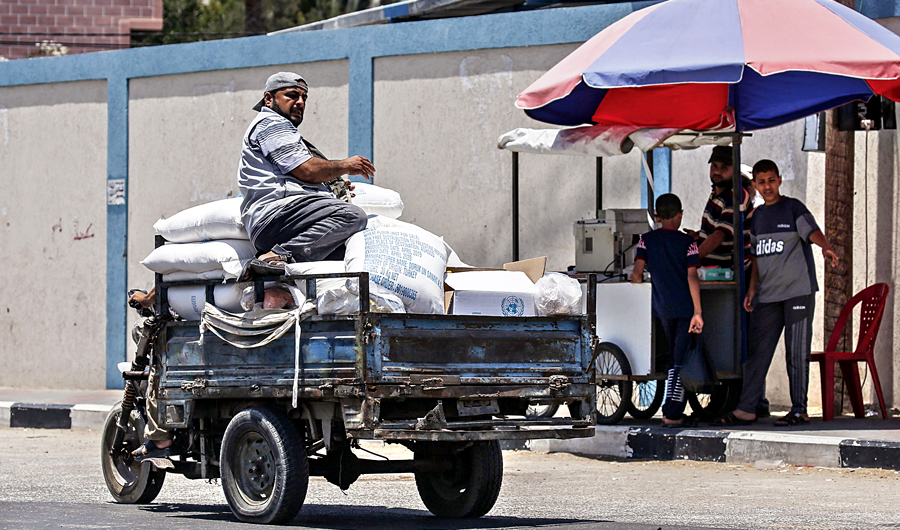Macron warns Tehran against further nuclear deal breaches
PARIS/DUBAI: France urged Iran on Tuesday to reverse its first major breach of a nuclear pact with world powers as European states signalled they would not seek to reimpose UN sanctions — for now.
The UN nuclear watchdog confirmed on Monday Iran had amassed more low-enriched uranium than permitted under the 2015 deal, a move that prompted US President Donald Trump to say Iran was “playing with fire.”
Exceeding the limit could culminate in the return of all international sanctions on Tehran but one European diplomat, asked if Europe would trigger the dispute resolution mechanism enshrined in the accord, said:
“Not for now. We want to defuse the crisis.”
A second diplomat said Britain, France and Germany would focus on bringing Iran back into compliance and that they wanted to gain more time for dialogue.
“In the immediate term, Iran must return to its obligations. There is room for dialogue,” a French diplomatic source added.
Tensions with Iran have escalated since Trump pulled the United States out of the pact last year and moved to bar all international sales of Iranian oil. Washington also blames Iran for bomb attacks on ships in the Gulf, something Tehran denies.
In a joint statement Tuesday, the foreign ministers of Germany, France, the UK as well as the European Union’s foreign policy chief said that “we have been consistent and clear that our commitment to the nuclear deal depends on full compliance by Iran.” They called for Iran to reverse the move “and to refrain from further measures that undermine the nuclear deal.”
They added that they “are urgently considering next steps” under the terms of the agreement in close coordination with other signatories.
The three European countries, Russia and China remained on board the 2015 deal meant to curb Iran’s nuclear ambitions after the United States withdrew last year.
Opinion
This section contains relevant reference points, placed in (Opinion field)
European signatories to the nuclear accord have sought to pull back the longstanding foes from direct confrontation, fearing a mistake could lead to war accidentally.
At the same time they are under US pressure to reimpose their own sanctions to force Iran to comply with an agreement Washington abandoned against Europe’s advice.
Iranian Foreign Minister Mohammad Javad Zarif denies Iran is in violation of the accord, saying Iran is exercising its right to respond following the US pullout.
China, like France a signatory to the deal, said it regretted Iran’s move but urged all parties to exercise restraint and said the US policy of increasing pressure on Iran was the “root cause of the current tensions.”
The nuclear deal lifted most international sanctions against Iran in return for curbs on its nuclear work. It aimed to extend the time Tehran would need to produce a nuclear bomb, if it chose to, from roughly 2-3 months to a year.
Iran’s main demand — in talks with the European parties to the deal and as a precondition to any talks with the United States — is to be allowed to sell its oil at the levels before Washington pulled out of the deal and restored sanctions.
Iranian crude exports were around 300,000 barrels per day (bpd) or less in late June, industry sources said, a fraction of the more than 2.5 million bpd Iran shipped in April 2018, the month before Trump withdrew from the nuclear deal.
Iran says it will breach the deal’s nuclear curbs one by one until it is able to sell that amount of oil, saying this is the least it should be able to expect from an accord that offered economic gains in exchange for nuclear restrictions.
In a statement, French President Emmanuel Macron urged Iran to fully abide by all terms of the accord and “reverse without delay this excess, as well as to avoid all extra measures that would put into question its nuclear commitments.”
Iran’s semi-official Fars news agency reported that the country’s enriched uranium stockpile had passed the 300kg limit allowed under the deal.
“We have NOT violated the #JCPOA,” Zarif wrote on Twitter, referring to the deal by the abbreviation of its formal title, the Joint Comprehensive Plan of Action.
He referred to a paragraph of the accord dealing with the dispute resolution mechanism.
Iran’s parliament speaker Ali Larijani accused Trump of trying to bully Tehran with his remark about playing with fire, and said such language would only made Iran stronger.
Zarif reacted with exasperation to a White House accusation that Tehran had long violated the terms of the deal.
“Seriously?” he said in a one-word message on Twitter, after White House press secretary Stephanie Grisham said in a statement that “there is little doubt that even before the deal’s existence, Iran was violating its terms.”
Her comment contrasted with CIA Director Gina Haspel’s testimony in January to the Senate Intelligence Committee that “at the moment, technically, they are in compliance.”
Daryl Kimball, the executive director of the Arms Control Association, said the White House charge was illogical.
He said that at the time the nuclear deal was concluded, Tehran and the IAEA agreed on a roadmap through which Iran was addressing the nuclear watchdog’s unanswered questions about the nuclear weapons research program that the IAEA and the US intelligence community assessed ended in 2003.
“The process is still underway,” he said.

Iraq PM curbs powers of Iran-backed armed groupsMossad chief says Iran carried out Gulf attacks, Tehran offers bullish response



